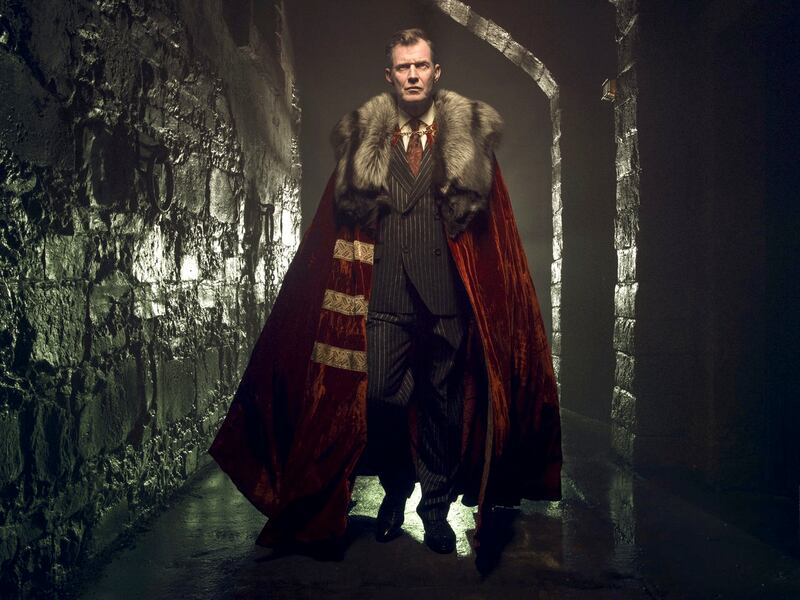Fox’s Gotham didn’t have Batman, but at least it had his extensive rogues gallery (as well as police buddy Jim Gordon). Pennyworth, on the other hand, has no Batman and no classic villains. Instead, what it offers is a revisionist version of his parents and, per its title, his beloved butler Alfred in an origin story that charts the trusty servant’s early years as a James Bond-ish spy in 1960s (?) London.
Which is to say, it’s a spin-off about a peripheral character that plays like a photocopy of another franchise, minus the only reason anyone cared about its protagonist in the first place (the vigilante in the cape and the cowl).
Created and written by Gotham showrunner Bruno Heller, Epix’s Pennyworth (premiering July 28) stars Jack Bannon as Alfred Pennyworth, a former SAS soldier now working as the bouncer of a London nightclub where the cabaret dancers shimmy and shake to covers of Black Sabbath’s “Paranoid.” Dressed in a tux, Alfred immediately proves himself to be a calm, cool, collected badass, which attracts the attention of customer Thomas Wayne (Ben Aldridge)—future father of Bruce, aka Batman—whom he soon comes to work for/with, thanks to his attempts to get his fledgling Pennyworth Security business off the ground. This, in turn, leads to all sorts of spy shenanigans, because Wayne happens to be enmeshed in a battle for the soul of the city being waged between two shadowy factions: the right-wing Raven Society, and the liberal No-Name League.
Bannon is dapper and charismatic, but his Alfred is imagined in only two dull dimensions. He’s clever, plucky, moral, cool under pressure and good in a fistfight or shootout. After falling in love with dancer Esme (Emma Corrin), there’s an extended dramatic bit in which he frets over his “animalistic” side, yet there’s no trace of actual beastliness to be found in him. Rather, he’s a neo-007, occasionally grappling with his blue-collar roots (and sparring with his butler father), and struggling with PTSD from his tour of duty in some ill-defined war against the Japanese (it can’t be WWII, because Alfred would have been a kid during that conflict) that’s depicted via turgid flashbacks.
Pennyworth takes place in a quasi-fictional past, which is evident through radio broadcasts about the German Reich, Britain’s practice of broadcasting public hangings on TV, and the occasional sight of airborne zeppelins, the last visible in habitually shoddy CGI’d exteriors. It’s also apparent from the narrative, which has Alfred crossing paths with an Alan Turing-esque gay computer genius who needs to be smuggled out of the country, and an older Whitechapel boogeyman known as Mr. Ripper. As with Pennyworth’s military service, the latter makes no logical sense if you’re trying to align this reality with our own, because that would mean Ripper was a toddler when he committed his 1888 slayings. One must therefore assume, since the show doesn’t explicate it, that Ripper is actually the infamous killer’s offspring—although why his last name is Ripper, when that was the fiend’s nickname, remains anyone’s guess. Far more problematic is that these faux-historical threads, and the conspiracy that emerges involving the British Prime Minister (Richard Clothier) and the Queen (Jessica Ellerby), lack color, excitement, and humor. They’re just…there.
Given that Alfred is from a working-class background and Esme comes from money (replete with a disapproving father), Pennyworth attempts to lace their romance with class tensions. However, it does so in a pedestrian and uncomplicated manner, which is also true of the story’s Raven Society-vs.-No-Name League political dimension, which is cast in comic-book terms. There’s simply no dynamic undercurrent propping up Pennyworth. That’s a problem considering that its surface-level action is standard-issue, all frantic chases through London’s misty streets, bouts of fisticuffs against generic ruffians, and subplots involving Alfred’s army mates Dave Boy (Ryan Fletcher), who’s a wild-and-crazy drunk, and Bazza (Hainsley Lloyd Bennett), who has no discernible personality traits.
With Pennyworth, showrunner Heller continues to mistakenly believe that the Batman property is fascinating without Batman himself; all that’s necessary to keep viewers enticed, he surmises, is a few tantalizing nods to the Caped Crusader myth. Those come, for example, via Mr. Ripper’s psychotic son Jason Ripper (Freddy Carter), who has a smile that deliberately recalls that of the Joker. Such touches merely remind one that the famed superhero isn’t walking through the proverbial door anytime soon, and that we’re stuck watching the cartoon espionage escapades of Alfred, who’s struggling to define himself as his own independent man—a goal that might resonate if we didn’t already know that his fate is to become the loyal domestic help of his crime-fighting billionaire boss.

Jason Flemyng stars in Pennyworth
EpixUnsurprisingly, the most engaging elements of Pennyworth are its bad guys, led by Lord Harwood, a Raven Society bigwig played by Jason Flemyng in a regal overcoat and with a fanatical disposition (until he’s brought very, very low, at least). He’s accompanied by sidekick Bet Sykes (Paloma Faith), a cutthroat villain whose character evolves in bonkers ways over the course of the show’s debut episodes. Faith has a chipper demeanor that’s at odds with her more ruthless inclinations, and as she navigates a plot that eventually puts her in touch with both Esme and her dominatrix sister Peggy (Polly Walker), she transforms into an unpredictable adversary whose allegiances are hard to discern—thus making her the series’ standout figure.
Alas, Bet is often relegated to the sidelines during early episodes that focus on Alfred’s relationship with No-Name League operative Martha Kane (Emma Paetz)—aka Batman’s future mom—and are marked by routine instances of torture and riffs on various movies (including, noticeably, Hot Fuzz). Before the end of its fifth episode, the show delivers a shocking bombshell that’ll have genre fans screaming “Woman in the Refrigerator!” The rest of the audience, meanwhile, will likely wonder why they’re expected to be invested in a kid-spy series that keeps reminding them that they won’t be getting the very thing they like about this fictional universe. If, that is, viewers stick around at all—a proposition that, on the basis of Pennyworth’s initial run, seems dicey at best.


